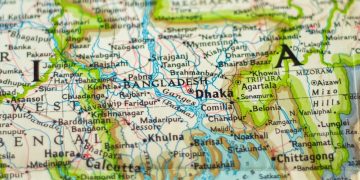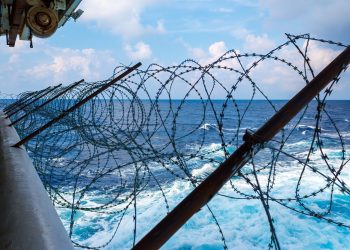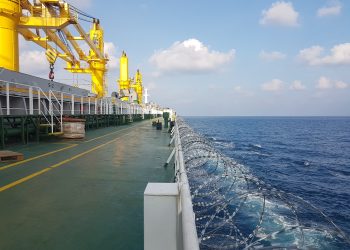The UN Security Council expressed its deep concern over piracy and armed robbery at sea in the Gulf of Guinea, and stressed the importance of a comprehensive approach — led by States of the region, with international support — to address the problem and its root causes.
Issuing presidential statement S/PRST/2016/4, the Council strongly condemned acts of murder, kidnapping, hostage-taking and robbery by pirates in the Gulf, and underlined the importance of determining any links between piracy and armed robbery at sea, and terrorist groups in West Africa and the Sahel subregions.
It encouraged regional organizations — including the African Union, Economic Community of Central African States (ECCAS), Economic Community of West African States (ECOWAS) and the Gulf of Guinea Council — to enhance cooperation on maritime safety and security, calling upon States in the region to criminalize piracy and armed robbery at sea under their domestic laws.
The Council went on to encourage bilateral and multilateral partners to help enhance the anti-piracy capabilities of regional States and organizations in terms of personnel, funding, technology, training and equipment.
It welcomed the Extraordinary Summit of the African Union to be held in Lomé, Togo, on 15 October, which was expected to adopt a charter on maritime safety and security, as well as economic and social development in Africa.
Before issuing the presidential statement, the Council heard a briefing by Tayé-Brook Zerihoun, Assistant Secretary-General for Political Affairs on Piracy and Armed Robbery at Sea in the Gulf of Guinea.
He said there had been a steady decline in the number of recorded incidents and illegal activities over the past few years, but insecurity remained a source of concern. Six attacks had been reported in the first quarter of 2016 alone, in addition to ship hijackings off the coast of Nigeria and kidnappings along the coasts of Western and Central Africa.
As a result of the Yaoundé Summit, the Interregional Coordination Centre had been inaugurated in 2014 with the aim of coordinating anti-piracy operations, he said.
However, due to staffing, funding and other logistical constraints, it was not yet fully operational. Flexible and proactive efforts at the national, regional and international levels would be needed in responding to perpetrators who had proven to be highly adaptable, well informed and increasingly sophisticated.
During the ensuing open debate, Robert Dussey, Togo’s Minister for Foreign Affairs, Cooperation and African Integration, briefed on the upcoming Lomé Summit, saying it would see the adoption of an African charter on maritime security and development.
The Lomé charter would promote a flourishing blue economy that would in turn encourage environmentally friendly development, incorporating a common fisheries policy and measures to tackle illegal fishing, he said, adding that it would build upon the 2050 Integrated Maritime Strategy for Africa, paving the way for further initiatives and actions.
Several speakers noted that piracy and armed robbery at sea were symptomatic of governance and development issues. They called for greater international support to support regional efforts, particularly at the level of the International Maritime Organization (IMO) Maritime Security Trust Fund for West and Central Africa.
Morocco’s representative noted that the Gulf of Guinea had become the new centre of gravity for piracy in Africa, taking the spotlight away from the Gulf of Aden. Endowed with 8 per cent of the world’s petroleum resources, as well as fisheries and significant maritime traffic, it had plenty of targets for pirates.
It was high time the Gulf of Guinea — where the pirates were reputed to be among the most violent in the world — benefited from the same international cooperation extended to the Gulf of Aden, he emphasized.
Egypt’s representative, however, said pirates operated differently in the two regions, so the response must also be different, reflecting different political and security situations. It was important that the shipping industry adhere to best practices in high-risk waters, he said, emphasizing that there was no time for complacency.
Nigeria’s representative said that criminal gangs motivated by access to crude oil, and people involved in trafficking illicit goods, as well as small arms and light weapons, had been operating in the Gulf of Guinea. Governments around the Gulf must pursue piracy networks on land and enhance their naval and air power so as to respond appropriately to maritime attacks.
Senegal’s representative noted that Gulf of Guinea piracy and armed robbery was no longer limited to the oil sector, but had now branched out into trafficking in people, drugs, weapons and generic medicine, as well as illegal fishing. That complicated the ability of regional States and their international partners to mobilize.
The representatives of both the United States and the United Kingdom called attention to attacks launched against two ships in one day off Nigeria’s coast earlier in April, which — considering the countries where the vessels were registered, their cargo and crew – involved no fewer than seven Member States. Their counterparts from Ukraine and Turkey recalled how citizens of their respective countries had been captured by pirates in the Gulf of Guinea.
The representative of Cyprus said a fresh Security Council resolution on piracy and armed robbery at sea might prove helpful, while his counterpart from South Africa said the Council should send a clear message to the end-users of pirated goods.
Source : UN Security Council

































































